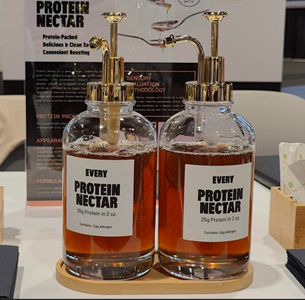At its annual conference, the Institute for Food Technologists (IFT) provided a glimpse into how the future of food is being shaped by leading food scientists, processors, and innovators. This year’s theme was “future proofing our food system”, reflecting the struggles of the global food system over the past few years, for numerous reasons. The top three trends were all about protein, formulation, and sustainability in our food system.
The future is protein
The first top trend, unsurprisingly, was the rise of protein to the top of the food chain. Attendees at IFT FIRST event experienced multiple innovations presented in protein sourcing, production, and applications. These ranged from lab-grown seafood proteins by Blue Nalu to the use of plant-based proteins to reduce food loss in vegetable oils by Shiru and plenty in between.
Innovation around proteins is critical for future food systems, as more and more societies increase protein as a significant part of their daily nutritional needs.
Demand for protein in the US, as well as globally, has grown consistently over the past few years
As the chart below shows, the demand for protein in the US, as well as globally, has grown consistently over the past few years, and with rising population growth, finding new ways to produce healthy and affordable proteins seems to be a key issue for the future of our food system.
One product that seemed to capture many of the imperatives of developing protein needs was “Protein Nectar” by Every Company. This liquid provides 25g of protein in one 2oz serving, tastes like a combination of agave and maple syrup, and can be used as a sweetener for foods and beverages, increasing the daily intake of protein without the consumer even noticing. A precision fermentation start-up, Every Company has created this syrup using animal-free proteins. Such innovations can help bring whole proteins to a wider audience, take up little space, and improve the variety of foods we consume that contain protein – a great example of the future of protein in a resilient food system.

Source: Miri Eliyahu at IFT FIRST, 2023
Clean label solutions
IFT FIRST (FIRST= Food Improved by Research, Science and Technology) had hundreds of booths, with products/companies aiming to help food producers be more efficient, create healthier foods, improve the longevity of packaging, and so on. One prominent aspect of food production at the event (with dozens of companies focused on this) was how to make a product clean label. There is no single agreed definition of this concept, but a widely used one is “under eight ingredients”. Moving away from busy ingredient labels means packaged foods require a shift in formulation, while still upholding standards of fortification, shelf-life longevity, taste, and texture. This is a tall order, and IFT FIRST showcased attempts to tackle such challenges.
In recent years the food industry has increasingly turned to technology to solve some of its production challenges. Clean label challenges are no different. Clean label gained prominence with consumers during the COVID-19 pandemic, and has since maintained its importance, according to Euromonitor’s Voice of the Consumer: Health and Nutrition survey.
Approximately 19% of consumers across the generational spectrum looked for clean labels when shopping in 2022 and 2023
Source: Euromonitor’s Voice of the Consumer: Health and Nutrition survey
The IFT FIRST: Annual Event and Expo offered an array of approaches to clean label, with 22 exhibitors specialising in this, eight educational sessions, and over 30 show features looking at ingredient solutions within existing formulations such as starch and proteins, focusing on potatoes and dairy. This is clearly a pillar in the future of food.
Sustainability and reduction of food loss
Making our food system more sustainable was a key element at IFT FIRST. The solutions and innovations presented ranged from on-farm solutions (e.g., regenerative agricultural practices, vertical farming, etc.) to end of production solutions, such as enhanced recycled packaging. However, one solution that was somewhat prominent focused between these two ends of the production process. As food scientists continuously strive to create a more sustainable food system, one key aspect is reducing food loss during production. Food loss can occur at many stages of food production; for example, through underutilisation of raw materials available to use, or through discarding parts of the ingredients during processing. By using discarded ingredients from one product in other applications, otherwise known as upcycling, food loss can be reduced.
Upcycled products had a notable presence at the event’s Startup Pavilion, with several booths promoting these. Renewal Mill, for example, offers upcycled flour blends that are also vegan, gluten-free and contain proteins. All the flour blends are sourced from upcycled ingredients from the production of other products, which would otherwise be wasted. For instance, oat milk and can be used in the production of baked goods and confectionery to reduce the carbon footprint of the product. On the other side, Deeplant offers food loss reduction in meat processing by accelerating the meat ageing process, which is required to achieve a more tender and palatable cut of meat. Accelerating the meat ageing process contributes to quicker tenderising of the meat, leading to lower rates of contamination and food loss, with the process reducing from sic to eight weeks, to two weeks after enzyme treatment. Considering the already high environmental cost of meat, food loss reduction solutions for meat products could make it more sustainable overall.
To conclude, the Institute of Food Technologists's IFT FIRST event offered hope that in a few years global food systems could be cleaner and more sustainable, offering consumers high-quality affordable proteins in their diet.
For further insight to sustainability claims read our report, Environmental Sustainability: Country Performance and Product Claims
